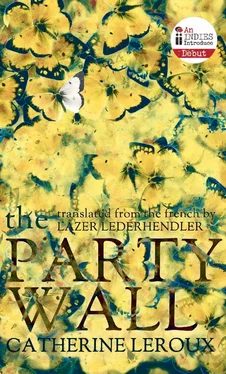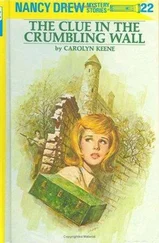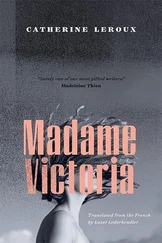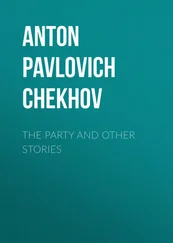“I don’t need you!”
“Oh, I do realize that. And, you know, I don’t need you either. But that doesn’t mean we need to avoid having a relationship.”
She punctuates this last statement with a hard punch against the wall. Madeleine is surprised by both her gesture and the flimsiness of the wall. Without thinking, she goes on pounding the wall with all her might, with her hands and feet, with the strength of the righteous and the stubbornness of the tender-hearted, with a sort of love that passes through her muscles. Slowly, the partition gives way, the panelling crumbles under the blows, and the familiar angles of the corridor become visible.
“You’ve completely lost your mind.”
Her eyes are fixed on the gap; Madeleine is no longer looking at her son.
“I was hoping that at least all this shit — the illness, the DNA business — I was hoping it would bring us closer together. That you would learn to speak to me.”
“And where would I have learned that? You never tell me anything. Nothing about your family, about your life with dad. I lost my father at seventeen and you never talk to me about him. It’s as if he never existed. And you! People in town say you have a lover, that you take pictures on the seashore. I know nothing about any of it.”
“You never asked me anything!”
“Neither did you.”
On the other side of the hole, Yun’s tear-streaked face appears.
“Anyway,” Édouard mutters, “there may not be an ‘after the transplant.’”
Right then, the beeper lying on his nightstand starts to vibrate. It’s the hospital. They’re expecting Édouard.
Sitting in the grey waiting room, grey like all the waiting rooms in the world, Madeleine thinks about Micha and his cancer, her sister and her psychotic episodes, her father and his cirrhosis. It seems that every ten years the flesh of someone close is demanded of her, as if a Minotaur were pacing along the maze of hospital corridors, lurking behind the respirators and MRI devices. “It’s time for him to leave me something. It’s time for me to leave here together with my loved ones,” she decides while her son is subjected to a battery of tests.
Because, to be entitled to a kidney, he must pass a raft of examinations. The long road to Halifax was not the last stop. Nor will the transplant — assuming it actually happens — be the finishing line. Sixty days will be needed to be sure the body has not rejected it. Before the great event, it is imperative to verify that the recipient is perfectly healthy and completely free of viruses. With her fingers clutching her key ring, Madeleine makes one wish after another, laying claim to all the wishes that, for lack of inspiration, she did not make on her birthdays, and all the shooting stars she passed up on. In the space of a few hours she has turned into a superstitious freak.
After several hours of testing, Édouard is set free. He is tired; the clock struck twelve long ago. The operation has been scheduled for the next morning. While he is getting settled in a room that looks more like an alcove Madeleine can easily see that her son will not be sleeping.
“Would you like me to ask for a tranquillizer?”
Édouard’s gesture means no. He seems to have forgotten their quarrel; his brow is dark but shows no sign of anger. On the other side of the curtain a man groans between nightmares. He is dreaming of a giant cigarette, Madeleine guesses from the whistling sound of his breathing; he is dreaming that he is wallowing in smoke. She can almost smell the aroma of tobacco drifting above his bed. She can recognize a true smoker with her eyes closed, the ones who wake during the night for a few puffs, the ones who are doomed. Micha slept just like that toward the end.
The noises in the corridor die down, but Édouard can’t sleep. His eyelids grow heavy and suddenly start to flutter but then they pop open again. Madeleine places her fingers on her son’s arm. Under the skin, his nerves are restless.
“Édouard, I’m convinced it will be just fine. You’ve got everything on your side: you’re young, you’re strong. And there’s something about you that not many have. You accept everyone. I’ve never seen you judge someone or reject the company of another person.”
Édouard’s face is tense and he frowns. Madeleine elaborates:
“How could your body reject a kidney? If you’d known the donor you would surely have liked him. You would have bought him a beer and talked about Johnny Cash, Kerouac, baseball — right? It’s written in your cells. Every fibre in you knows it.”
The water wells up in Édouard’s eyes. For many minutes he keeps silent. Then he gives Madeleine a look so desperate that she is obliged to lean closer.
“All that doesn’t make the slightest difference. I’m going to die, Ma.”
“Don’t talk like that.”
“No, I’m sure of it. This disease, it didn’t just happen. It’s punishment.”
Madeleine straightens up and gazes at her son in bewilderment. He averts his eyes, and what he exudes is in fact shame, scuttling out of his pores like rats fleeing a ship. The palms of Madeleine’s hands grow damp.
“Punishment for what?”
“For choosing to save my skin instead of saving a life. Two lives.”
“What are you talking about?”
“A few months ago, in Savannah, I witnessed a horrible accident. Two little girls hit by a train. They tried to get away, but they weren’t able. There was blood everywhere. I saw them. But instead of going to help them, I… I hopped on the train.
“You didn’t alert the authorities?”
“I couldn’t. I couldn’t.”
He pauses to push some air through the sobs that are choking him. Madeleine breathlessly kneads his arm.
“I’m a piece of shit. I let two children die. And now it’s my turn to die.”
Madeleine says nothing more. She can’t find the words to tell him that is not how life works, to explain to her still very young son that the world is not a vast pair of scales where bad actions offset each other, where misdeeds are consistently sanctioned. The world is an unjust place where the good go bad from never being rewarded, where the truly wicked are very rarely punished and where most folk zigzag between the two extremes, neither saints nor demons, tacking between heartache and joy, their fingers crossed, knocking on wood. Every person split in two, each with a fault around which good and evil spin.
When the pale morning light comes through the curtain separating them from the sick smoker, she finally manages to utter a few burning words.
“You won’t die. It’s impossible. Because I love you.”
She very gingerly gets up and gives up her seat. Yun is standing in the doorway wearing a purple dress that seems to herald a celebration, a healing, but in which Édouard will see the colour of grieving. In fifteen minutes, the anaesthetics will carry him off to the murky lands of his consciousness and a stranger’s kidney will come to nestle in his back like a hazardous treasure.
“I wonder what the person was like,” Yun says pensively.
“The donor?”
“Yes. We don’t know anything about him — or her: age, sex, if he loved his kids or believed in God.”
Madeleine nods. Already over the past two hours she has formed a very clear idea of the person she pictures as having left Édouard a kidney, so that she has a detailed image of the man in her mind. A father in his forties, a long-haul truck driver who died of a heart attack after discovering his wife was having an affair with their neighbour. His name is George, he likes bowling, barbecues, and Simon & Garfunkel. To make amends, his widow agreed to donate all the dead man’s serviceable organs: the lungs, pancreas, kidneys, and eyes. She convinced herself that half a dozen lives saved would make up for a cuckold’s death in the eyes of God.
Читать дальше











